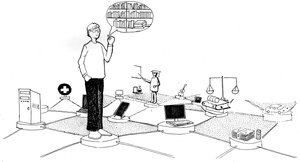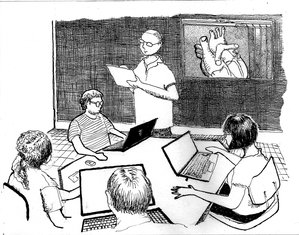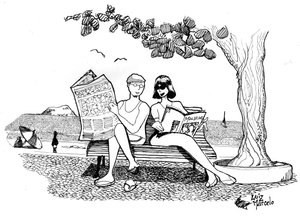Knowledge Management – Part I – The Society Evolving with Digital Information
Today, Knowledge has undergone intense transformations with technological revolutions. Everything we study in the classical approach to the set of media; the acquisition and transmission of knowledge is being reviewed in multiple aspects.
Knowledge has always had a strategic role in all activities, and all human life and its interactions can be differentiated in front of their peers in the way knowledge is acquired and used.
The education, the academies, the professional activity and the action of instructing are today all transformed under the prism of the knowledge of the network, before only in books, handbooks, specialized magazines, blackboards or lectures.

This is done by adding, competing, replacing our basic way of dealing with knowledge. All traditional activities are modified when connecting seeking knowledge – disseminating, commenting, prioritizing, classifying. Knowledge is largely migrating to the network, in a very different way. The traditional knowledge existing in traditional media, when it migrates, is complemented by a kind of meta-knowledge.
Filters, prioritization, categorization, indexing are as a part of this knowledge, because they add information to what would be traditional, that is, information gets richer in the network, just because it is there and consumed with the new technologies.
In the early days of the internet, who could have foreseen the reach it would take in terms of content? Who could have predicted that the e-book market would begin to take part in the traditional book market consistently?
Today it is estimated that there are about 4 Zeta Bytes (or 1KB to seventh power) in the digital world. All this information on the network changes our way of thinking, because as our actions in life is very much based on knowledge, to the way of manipulating knowledge induces different thinking. The knowledge society, now immersed in a full paradigm shift, where information is acquired irregularly, fast, uncontrolled and full of new contents with each click, also changes the manner to fix and transmit knowledge. Are we becoming less concerned with information accuracy and in-depth analysis, but on the other hand, becoming aware of a number of previously inaccessible issues?
The Texts we consume in Blogs, e-Books, online news media are filled with hyperlinks, and reading them continuously and analytically becomes more unlikely when it is possible to move quickly (from a traditional sequence led by the authors of “old” media) to indeterminate destinations many times. The experience of acquiring knowledge becomes more particular than before and the interaction with this acquisition changes behavior. The way of thinking becomes more interactive and diffuse.
Behavior
Will the effects of the Internet on human culture be great?
Are we experiencing a drastic change in behavior?
The behavior on the network is no longer Geeks or young people, but also, it transforms into almost all groups?
Do the relations of consumption, use, socialization, and learning change each group, composing even a new way of conceptualizing culture?
I believe that many who analyze social behavior and culture would answer yes to all these questions.
More or less drastic – “The Death of Culture” or “The End of Culture” and on the other hand “Hyper culture” or “Cyber culture” – bring a certain perplexity with which many analyze this change in human behavior.
Certain behaviors perceived as divergent or innovative are supported by this new culture. It is not therefore presupposed that there is necessarily greater evolution, greater precision and even more certainties, in principle, only more information.
One can be right or wrong nowadays full of reasons justified by the search sites, blogs and all the social media.
It is as if the truth in the digital world were distributed in a normal curve, where a certain pattern may predominate, but given the high volume, one can find multiple opinions. Unlike the behavior of acquiring traditional knowledge, where schools of thought directed towards a certain convergence of knowledge, the digital world allows a certain harmony with the source (web) after all anything that one wants to determine on any subject.
In a world of high volume, not only do diverse opinions support many positions, but it is very common for facts (references or cases) to support each argument.
One way to understand this dichotomy of convergent traditional knowledge is to think of this convergence as a filter of massive or scattered information. What enabled the evolutionary march of civilization around knowledge was the use of a suitable filter, that is, winning ideas gave civilizations their tool of domination and shaped behavior around what is wise or cultured, maintaining the best knowledge.

Would the Web be a withdrawal of these filters as this convergent versus dispersed information antagonism?
Before we imagine the destruction of thought and culture, we must also ask ourselves if this form did not produce a certain ruling class, an elite of knowledge. Was Cartesian thinking for all? Have not good ideas been discarded for not being included in this form of Cartesian thought? Not to mention those who paid with life or away with very innovative ideas for their time, even becoming a truth of the elite itself some time later.
But yes, let’s consider that many today propagate their truths without a more conservative questioning, in the sense of comparative, common sense, social values check, etc. That is, if the information to be propagated is based on valid knowledge, whether innovative or not.
Here we have another dimension that relates to this behavior, the speed of propagation. Like memes, rumors, reporting holes, etc. To speak before is to be more read, to speak before is an instrument of power and status in this new world.

Mistaken information negatively affects someone’s reputation on a much smaller scale than having as a habit giving only information that is already old, it seems. The memory for social media evaluates the opinions of social peers or simply the number of hits, spreads or views.
On the other hand, academies, which theoretically advocate traditional Cartesian thinking, are pressured to expand their production to the Web itself in a more or less controlled way, containing the moderators as a light filter. There is even a line of thinking that advocates a collaborative review on the Web itself for its academic output. It is not surprising that even open-minded questions are posed that positive and negative impacts are relevant in this path of thought evolution.
In journalism, for example, with the popularization of common collaborators, in various ways, it is perceived that the value of information tends to change in concept, as the sources of observation and records are now enlarged and this becomes more important than objective form and sequenced a story from a story. Professional journalism also needs to anticipate, expand, use social networks even by competition.
Again, there is a dispersion of knowledge here, where volume, diversity, divergence and expansion of territory coexist.
Social media in all its forms with its unparalleled resources take away the look of learning from the search for knowledge from the traditional academic world to the digital world.
New figures as bloggers shift the role for themselves from digital publishers and readers become digital publishers as well as simple readers. A change of behavior that expands day by day.
In fact, behavior in the face of this new knowledge is a subject still in transformation, we are in the midst of a great change.